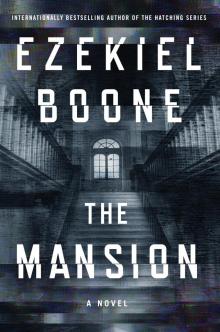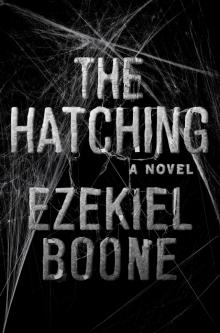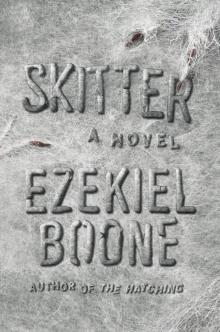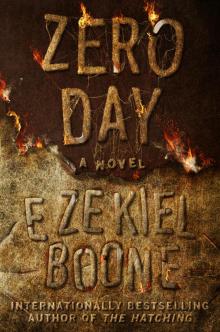- Home
- Ezekiel Boone
The Mansion Page 6
The Mansion Read online
Page 6
Against her sister’s advice, she’d applied to only five schools. Beth had taken the safest path available. She’d graduated from Northwestern and gone straight for her accounting certification and then met and married Rothko, moving from an apartment to a condo in Lincoln Park, and never, not once, returning to visit. Emily didn’t blame her sister for that. She would have left and never come back if she could have. Emily had gone to visit Beth, though, almost dutifully, twice a year, taking the short flight to Chicago. They talked on the phone all the time, but her trips to Chicago were limited by what she and Beth could afford: a few days in the fall, a few days in the spring. That’s how much time the sisters spent together, and it was a chance for Emily to see what different world awaited her. But Northwestern still felt too close to Kansas City, to their father, for Emily. Neither girl talked about it, but they both knew it had gotten worse at home since Beth had escaped. Emily worried that she would still feel the gravity of their house, pulling at her like a black hole even from five hundred miles away. Like the highway was simply a long string that their father could tug. No. Not Northwestern. So she sent her applications, five of them only, out east, to towns big and small and in-between: to Princeton, New Jersey; to Hanover, New Hampshire; to Durham, North Carolina; to grand old New York, New York; and, of course, to Cortaca, New York.
Because two of those letters had already come back thin and dead, rejections postmarked Princeton, NJ, and Hanover, NH, she expected the worst when she saw the envelope that had winged its way to her from Cortaca, NY. Another rejection, she knew. She’d left the envelope unopened on her nightstand overnight, unable to face it, only opening it in the morning, when she woke to go to school, thinking that she could deal with it then, with a full and new day in front of her. But Cortaca University had not rejected her. Cortaca University had offered her scholarship money and financial aid. Cortaca University wanted her. Cortaca University wanted Emily Wiggins so badly that they would pay for her to come. Cortaca University had open arms for Emily Wiggins.
So she turned down slightly less generous offers from Duke and Columbia and worked double shifts all summer, bagging groceries in the mornings and afternoons, working the concession stand at the movie theater until the late, late show let out. A way to bank some money and an excuse to leave the house before her father was up and to come home after he was already passed out. When the time came, she left the house before dawn, quiet as a mouse, not bothering to say good-bye to her father. She boarded a bus and headed east, all the way to Cortaca.
Her dorm room was a quad, and although her roommates didn’t try to make her feel bad about her lack of money, they couldn’t help themselves. They were warm and thoughtful young women, but they were also the sort of women who thought of an Ivy League education as a birthright. Stacy was from Pittsburgh, her parents both lawyers, her graduation present from high school a new and very practical all-wheel-drive SUV to deal with the snow north of Syracuse. Tillmont Graves—Tilly—who constantly bemoaned that her cell phone and her winter boots were a year behind the trends, came from New Hampshire with her father’s credit card in case of emergencies. Tilly’s father was a full professor in philosophy at Dartmouth, one of the two schools that had, incredibly, said no to Emily. When Emily finally divulged that fact to her roommate, Tilly had expressed surprise that anybody would truly want to live in the small town of Hanover. And, of course, there was Marge, whose mother was the granddaughter of the kind of man who was inevitably described as an “oil baron.” Marge brought Emily home with her for Thanksgiving and Christmas every year of Emily’s time at college, and quietly and gracefully paid for Emily’s plane tickets and share of the hotel rooms for all their spring break trips, all four of them pretending that it wasn’t happening. They became lifelong friends, and since graduation they’d done a girls’ weekend at Marge’s cottage on Martha’s Vineyard during the summer, and an extended weekend at Marge’s beachfront house on Kauai in the winter—even though, as things went downhill with Billy, that meant Marge had to once again cover Emily’s expenses. She still went to New York City every other year to have Thanksgiving at Marge’s parents’ ridiculous six-thousand-square-foot Upper East Side apartment overlooking Central Park.
A great group of friends, but they were the kind of girls who never understood what it was like to jump without a parachute.
She looked through the driver’s window and watched Andy heave himself into his Porsche, the museum piece of a sports car rocking at the weight, and then she turned the key in the ignition. Andy didn’t have to worry about his car starting. It was an antique, but his mechanic kept it tuned. All he had to do was turn the key; every time, the Porsche let out a growl to hint at its power. Thankfully, Emily’s own car started on the first try. Having to get a jump from Andy was just as embarrassing as his paying for dinner.
God. Shame. There was a moment in her life when Emily truly thought she’d left that all behind, when she believed that a degree from Cortaca University would be a ticket to a new life.
But she didn’t have a degree.
Before it actually happened, she would never have believed it if somebody had told her she was going to throw it all away. She would never have believed it if somebody had told her that she’d leave college at the end of her junior year, that she’d end up broke and working in a preschool in Seattle with a marriage that was, at times, needle-thread thin, that it would all be because of a boy . . . Boys. Plural. Because that’s what Shawn Eagle and Billy Stafford had been when she’d gotten involved with them. Boys. Boys living in a shack in the woods and scrounging so badly that they’d made her, for once in her life, feel like she was the rich one.
But she’d made her choice. They had all made their choices.
She waited until Andy drove away and then she turned off the ignition.
She was crying too hard to drive.
FIVE
* * *
AUNT EMILY IS SAD
The twins never made any noise coming into her room. Beth would be fast asleep, her husband, Rothko, snoring beside her, and then suddenly, she’d be awake, feeling the girls staring at her. Ruth and Rose were small for their age. From a distance, particularly when they were among their second-grade classmates, they looked so much younger than seven. But their size didn’t explain how they could move so noiselessly in the night. During the days, when they were playing, the girls could sound like a pack of wolves running down the stairs, their goldendoodle, Rusty, coming after them. And when they were having what they called “adventures,” she often mistook their yelling for something calamitous.
The truth was, almost since they’d been conceived, she’d been waiting for something calamitous to happen. She’d laughed at her sister’s stories of creepy old Eagle Mansion, and she’d always have a fondness for the place where the girls were conceived—she’d been meticulous about tracking her period—but her pregnancy had been marked by unsettling events and portents. Weird sounds rattling through the air ducts as she fell asleep, cats following her on the street, dreams that left her shaken. Rothko claimed she was too sensitive, that she was giving in to old wives’ tales, but even he had been a little weirded out by the way both girls came out at birth covered with cauls. It would have been a little disturbing if it were just one of them capped by the errant piece of amniotic sac or whatever the heck a caul was made out of, but to have both of them come out that way? And then, neither one of them cried at all, not for the first hour or so. The obstetrician had even called in a crash code, a team of doctors and nurses grabbing Ruth and Rose to make sure their breathing wasn’t impeded. Both girls had been cleared, and once they’d been cleaned off, were normal little bundles of joy. Except for how quickly they opened their eyes and how calm they were. It was eerie, Beth thought, the way they seemed like they were staring at her. They were newborns, but they were so focused on her. Like they could see how much she loved them already. And when Rothko was near her, they focused on him as well. She swore they were watch
ing those first few days, even though, according to all the baby books, it was way too soon for them to see anything other than shadows and shades.
And there’d been other things since then. Part of the reason she’d married Rothko was that he was so steady and easy. Some of her girlfriends were well into their twenties and thirties before they figured out that “nice” and “good” should be high on their lists of qualities in a husband. Rothko didn’t mind that she wanted to stay home with the girls. It was a struggle, financially, for a couple of years, but Rothko was the one who’d pointed out that more than half her take-home would have gone to pay for childcare anyway if she’d gone back to work after they were born, and it’s not like it would hurt her career to take a few years off. Plus, they were both accountants. Maybe it wasn’t crazy-good money until one of them made partner—this was when Beth still thought there was a real chance that Emily and Billy were going to end up billionaires—but even in Chicago, they’d be fine on just Rothko’s salary until the girls were in kindergarten. But that meant he wasn’t home when the weird things happened.
She told him about a few of the instances. She told him about the time that a passing flock of starlings flew, one after another, hundreds of them, into the window of their ground-floor condo’s front room, until she was cowering, expecting the glass to break, but then, when it was all over, there was only a single dead starling, its neck broken, lying among a littering of feathers. She told him about the time she was at the grocery store and Ruth, maybe three years old, started laughing when the misters went off over the vegetables in the produce section, and then Rose started giggling, too, and then, suddenly, the fire sprinklers had gone off, flooding the whole store. She told him about how every dog in the neighborhood, every time she walked the girls through Lincoln Park in their lunky double stroller, seemed to roll on its back in a show of submission.
Rothko humored her, listening to the stories with a smile that was supposed to mean that he believed her and thought it was wonderful and strange, but really meant he thought she needed to make friends with some other stay-at-home parents. She didn’t tell him about the other, scarier things. How one afternoon, when the girls should have been napping, she’d looked at the monitor and saw both cribs completely empty and went running and crying into the nursery to find both of them fast asleep, hot and sweaty and twitching gently, dreaming the same twin dream. She didn’t tell him about how, in the winter, she sometimes worried that the cold winds would sweep through the cracks under the door, through the seams of the windows, and lift the girls away. She didn’t tell him about the homeless woman outside the Whole Foods who pointed at her and the twins and started screaming at them and wouldn’t stop. She didn’t tell him about the time she’d taken the girls to the Field Museum, and they’d gotten back later than she’d expected, and they were crying out of tiredness and hunger while she tried to quickly make them quesadillas, and then both twins had shrieked and, at the same time, the gas had flared up and over the frying pan and singed her hand.
And she didn’t tell him about the way, sometimes, they would ask for some sort of treat or something special and she would say no, and then they would ask again and she would feel something almost physical pass over her, a sort of static charge. And how sometimes, when that happened with people who weren’t her—Rothko, for one—the people seemed to change their minds.
At night, Rothko never woke up when the girls came into their bedroom like this. He was a heavy sleeper. Normally, so was she. His snoring wasn’t too bad, unless he had a cold, and she’d long gotten used to the occasional sound of a siren or a couple of drunk hipsters walking past their building. When they’d first started dating, they hiked and camped a lot, and she’d loved the sound of wind and rain and a tent on a clear, cold night, but that felt like a lifetime ago. Now the sounds of Chicago were a rhythm she understood after living there for so many years. And yet, even though the girls were so quiet coming into their room that Beth would have said they were entirely noiseless, they never failed to wake her up. She knew that if she opened her eyes, they’d be staring at her, patiently waiting.
So she opened her eyes.
“Aunt Emily is sad,” Rose said. Her voice was very soft, trying not to wake her father.
“She’s crying again,” Ruth said.
Beth sat up. She looked at her phone. Two in the morning. What was that? Eleven o’clock in Seattle? No. Midnight. There weren’t any messages or texts from her sister. She put the phone down and glanced over her shoulder at Rothko. He was deeply asleep.
“She’s in bed by herself and she’s crying,” Ruth said.
Rose nodded. “Uncle Billy isn’t with her. Is that why she’s crying?”
“I think you guys just had a bad dream,” Beth said. “Let’s let Daddy sleep, okay? Back to bed.”
The girls nodded obediently. They turned and walked out of the room to go down the hall.
Beth hated herself for thinking it, but it was true: there was something deeply creepy about her daughters. Sometimes. Mostly, they were great. Sure, they were a little small, but they’d been consistently small from birth. Not surprising for twins, and the pediatrician, Dr. Sendek, was very reassuring about that. He was reassuring about everything, really, with his gray walrus mustache and enigmatic European accent; he always made Beth feel better. Small for their age, but healthy and smart. They played soccer and took Spanish lessons, swim lessons on Tuesdays. When the weather was nice, they’d hook Rusty up to his leash and walk ahead of her to the park around the corner, even picking up his poop in the blue bags Beth kept in a plastic spool on Rusty’s leash. They liked school and had plenty of friends. Sometimes Beth felt like every weekend had a birthday party or a playdate or some other obligation that came with having children—one of the reasons they’d given up camping—and Rothko liked to joke that they’d be bored out of their minds with all the free time they had once the twins were in college.
The girls could be picky eaters sometimes, yes, but they never complained about sharing a bedroom. The condo was nice, and Beth loved their neighborhood, but if Lincoln Park had been a stretch before she’d had the girls, then the way the real estate market had gone up, she was glad they’d bought in when they had. Even with her back to work full-time for the past two years, a bigger place in this neighborhood was out of their reach. Or, it was out of their reach for a few more years, until she made partner. Not to say that they were tight; they had a fancy Audi and never had to think twice about ordering out for sushi or taking a nice vacation every year. While they didn’t have the kind of money to upgrade from a three-bedroom condo in Lincoln Park—she and Rothko used the third bedroom as an office, though it had a pullout couch for guests—to something bigger, they were doing fine. She’d said that to Emily over and over again, but her sister wouldn’t take a check. When things were at their absolute shittiest, before Billy went to rehab, Beth had flown out to Seattle for the weekend, leaving the girls with Rothko. Emily had let her pay for dinner and a trip to the spa, and then she’d agreed to come back to Chicago to live with her and Rothko and the twins for those last hard months before Billy finally went to rehab. She’d even let Beth pay for Billy’s rehab. But she drew a line at cash. She refused to take anything more than she’d already taken. Beth wasn’t naive enough to think that she and Rothko could do anything real about the debt that Emily and Billy had accrued—that mountain was too high—but she’d written her sister a check for five thousand dollars. Enough to make things just the tiniest bit easier.
“My mistakes,” Emily had said. “Mine to make, mine to fix.”
She’d torn up the check.
Beth followed Rose and Ruth past the room she and Rothko used as an office and into the twin’s bedroom. She watched the girls climb into their bunk beds. Supposedly, Ruth was on the bottom and Rose was on the top, but the girls switched so frequently, in some sort of order that only the two of them understood, that all Beth could ever do was wait and watch them and then tuck t
hem in. There was a night-light in the corner. She wondered if they were too old for one, but it didn’t really bother her. She’d seen night-lights that were closer to klieg lights, but this one was shaped like a brontosaurus and gave off only a soft, warm glow, like the power button on a computer. Just enough to cut the darkness with the shades pulled down. Not enough light to see each girl clearly, though. Not that it would have made much of a difference. Even in the light, both she and Rothko still had trouble telling them apart sometimes, and the girls liked to try to trip them up. All Beth had to do, however, was close her eyes. That never failed her. As much as the girls looked the same—and they were as identical as identical twins could be, from the mole each sported behind her left ear to the slight gap between their top front teeth—they didn’t smell the same. Rose was true to her name. Slightly sweet and fresh, no matter how many days it had been since she’d seen the inside of the bathtub. Not that Ruth was ever sour, but she carried a slightly earthier tone. Beth never said anything about it, not to Rothko, who often got the girls confused, or to the girls themselves, who were charmed by what seemed to them like a mother’s magic in Beth’s ability to tell them apart.
She took a step onto the lower bed, pulling on the railing so that she could reach the top one. “Good night, Ruth.”
“I’m Rose.”
Beth leaned in and kissed her. “Nice try, muskrat, but there’s no tricking Mommy.”
Ruth giggled. Beth got down and then leaned over to kiss Rose. Rose reached out and wrapped her arms around Beth’s neck, pulling her down and against her frail little body.

 The Mansion
The Mansion The Hatching
The Hatching Skitter
Skitter Zero Day
Zero Day